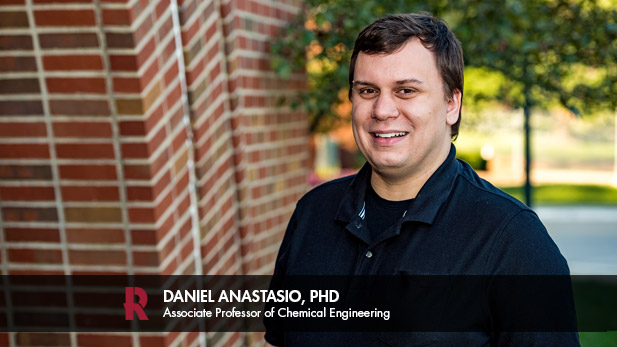Chemical Engineering Professor Earns National Scholastic Honors

Dan Anastasio, PhD, was recognized for outstanding teaching effectiveness, educational scholarship and computer-based innovations, including a virtual game that helps students make authentic process safety decisions.
Associate Professor of Chemical Engineering Daniel Anastasio, PhD, has received two national scholastic honors for distinguished contributions to teaching and advances to undergraduate science, technology, engineering, and mathematics education.
Anastasio was presented the Raymond W. Fahien Award for outstanding teaching effectiveness and educational scholarship by the American Society of Engineering Education’s Chemical Engineering Division. This award, presented during the recent ASEE Annual Conference in Baltimore, recognizes an individual’s contributions to chemical engineering education within the first 10 years of their career.
The ASEE division honored Anastasio for his significant contributions to gamification and game-based learning in engineering education, development of novel and small-scale laboratory experiments, and holistic assessment methods in chemical engineering laboratories. He also was highlighted for excellence in undergraduate education and service to the chemical engineering education community.
In another honor, Anastasio was part of a national team of college educators receiving the David Himmelblau Award for outstanding innovations in computer-based chemical engineering education, from the American Institute of Chemical Engineers’ Computing and System Technology Division. He shares this award with Cheryl Bodnar, PhD, of Rowan University (New Jersey), Daniel Burkey, PhD., of the University of Connecticut and Matt Cooper, PhD, of North Carolina State University. This collaborative research team developed the Contents Under Pressure (CUP) virtual game that helps introduce upper-level chemical engineering students to the practice of making authentic process safety decisions.
CUP places students in the role of a senior engineer at a petrochemical plant. Students interact with characters that represent their engineering team and must make a series of choices, keeping factors like time, safety, personal reputation, and plant productivity in mind. Gameplay takes place over several real-world days, with the decisions increasing in complexity and urgency. CUP illustrates how human factors can sometimes influence the decision-making process and lead to potentially unsafe conditions. It also helps students recognize when a scenario may require more in-depth ethical or moral reasoning, rather than a quick solution motivated by short-term gains.
Rose-Hulman’s Safety, Health and Loss Prevention course served as one of the pilot sites for CUP and in recent years CUP has become integral to the senior-year Professional Practice class. This gives the college’s chemical engineering graduates practice and experience in authentic simulations of real-world situations before beginning their careers in industry.
The development of CUP was conducted in collaboration with Filament Games, with funding provided by National Science Foundation’s Improving Undergraduate STEM Education (IUSE) initiative.
A member of the Rose-Hulman chemical engineering faculty since 2015, Anastasio has an extensive research background in engineering pedagogy, with a special focus on game-based learning and laboratory experiment design. His areas of teaching include fluid mechanics, separations, and process control, and his safety training research has been used to enhance Rose-Hulman’s senior-year chemical engineering professional practice course. He also has helped contribute makerspace-type resources such as 3D printing and prototyping to the department and is a co-director of Rose-Hulman’s Project SELECT, a summer campus program for pre-college students interested in science and engineering.
Anastasio earned bachelor’s and doctorate degrees in chemical engineering from the University of Connecticut in 2009 and 2015, respectively.